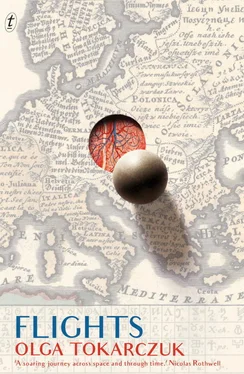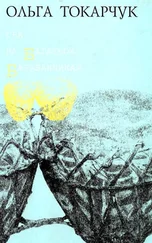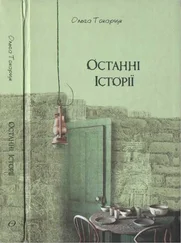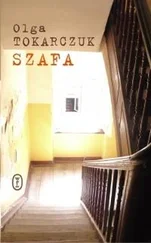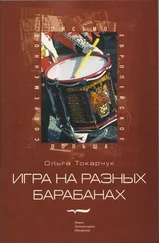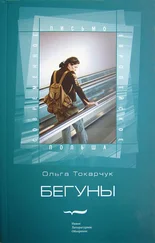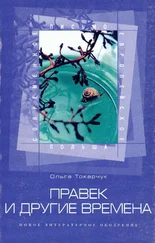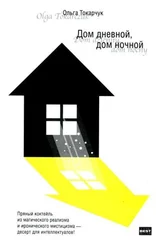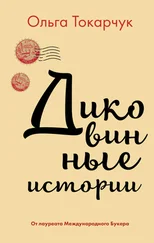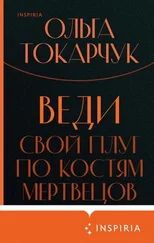When she moves, lost in thought, to the purses display, Kunicki picks up the bottle. Carolina Herrera, he reads. Should this name be retained or discarded from memory? Something tells him he should retain it. Everything means something, we just don’t know what, he repeats to himself.
He sees her from a distance – she’s standing in front of a mirror with a red purse on her arm, gazing at her reflection from one and then another angle. Then she goes to the checkout, right to Kunicki. He retreats in panic behind the socks shelf, bowing his head. She passes by him. Like a ghost. But then suddenly she turns around like she’s forgotten something, and she looks right at him, hunched over, with his hood pulled down to his forehead. He sees that her eyes are wide with astonishment, he feels her gaze, feels it physically: it works its way over his body, it gropes him.
‘What are you doing here?’ she says. ‘Do you have any idea what you look like?’
Then her eyes soften, a moment later, a kind of haze comes over them, and she blinks. ‘Jesus,’ she says, ‘what is going on with you? What is wrong?’
This is weird, this isn’t what Kunicki had expected. He had expected a fight. And then she wraps her arms around him and holds him to her, nestling her face into his bizarre second-hand jacket. A sigh works its way out of Kunicki, a little round ‘Oh,’ he’s not sure whether from surprise at her unexpected behaviour or because all of a sudden he can see himself bursting into tears into her fragrant down jacket.
It’s only when they’re in the lift that she says, ‘Are you okay?’
Kunicki says he’s fine, but he knows that they’re headed toward the final confrontation now. Their kitchen will serve as battlefield, and they’ll both take up attack positions – he by the table, she with her back to the window, as always. And he knows he shouldn’t underestimate this important moment, that this is perhaps the last and only possible moment to find out what happened. What the truth is. But he knows, too, that he is treading on a minefield. Every question will be like a bomb. He’s not a coward, and he will not back down in the face of establishing the facts. As the lift rises, he feels like a terrorist with a bomb under his clothes that will explode the second they open the door to their apartment and scatter everything to dust.
He props the door open with his leg so that he can slide in his shopping bags first, and then he squeezes in past them. In fact he doesn’t really notice anything out of the ordinary, he turns on the lights and sets out the groceries on the kitchen counter. He pours some water into a glass and sticks a fading bunch of parsley into it. This will bring him to, he thinks, parsley.
He passes through his own apartment like a ghost, he feels like he could walk through the walls. The rooms are empty. Kunicki is an eye that is figuring out one of those ‘Spot the differences between Picture A and Picture B’ puzzles. And Kunicki looks. There’s no doubt they’re different, the apartment now and the apartment from before. This puzzle would only work for the extremely unobservant. Her coat is gone from the coat rack, and her shawl, and the child’s jacket, the parade of boots (all that remains are his lone flip-flops), and the umbrella.
The child’s room seems totally deserted; in fact all that’s left is furniture. A single little toy car lies on the rug, like the bits and pieces leftover after an unimaginable cosmic crash. But Kunicki has to know for sure – and so with his hand held out before him he steals into the bedroom, to the wardrobe with the glass in the doors, which he pulls open; they are heavy, and they open begrudgingly, with a sad grumbling. All that’s left is a silk blouse, too fancy to wear. It looks lonely there by itself in the wardrobe. The motion of the doors. Kunicki looks over the empty shelves in the bathroom. His shaving appliances are still there, in the corner. And his battery-powered toothbrush.
He needs a lot of time to understand what he is seeing. All evening, all night, and even the next morning.
At around nine he brews himself some potent coffee and then gathers up some of his shaving things, a few shirts from the wardrobe, some trousers, and puts them in a bag. Before he leaves, as he’s about to go out the door, he checks his wallet: I.D., debit cards. Then he runs down to his car. Snow has fallen in the night, so he has to scrape off the windshield. He does so sloppily, by hand. He’s counting on being able to get to Zagreb by nightfall, and to Split by the following day. Meaning tomorrow he sees the sea.
He heads south, straight as an arrow, towards the Czech border.
According to travel psychology, the appearance of similarity between any two places is directly proportional to the distance between them. What is nearest seems absolutely dissimilar, totally foreign. Often the most striking similarities are ones we find – according to travel psychology – clear on the other side of the world.
Particularly interesting is the phenomenon of island symmetries. Unfathomable, unexplained, it is a phenomenon that would seem to merit its own monograph. Gotland and Rhodes, Iceland and New Zealand. Viewed without its partner, each of these islands appears incomplete, imperfect. The naked limestone cliffs on Rhodes are only complete when they meet the moss-coated cliffs of Gotland; the sun’s blinding glare is rendered real only in contrast with the golden softness of a northern afternoon. Medieval city walls can take one of two forms: dramatic or melancholic. This is well known to the Swedish tourists on Rhodes, who have established a kind of informal colony, unreported to the U.N.
On a plane from Warsaw to Amsterdam I was playing with a paper bag without realizing it; then I looked and saw it had been written on:
‘10/12/2006: Striking out for Ireland. Final destination Belfast. Students of the Rzeszów Institute of Technology.’
The inscription, in pen, was visible on the bottom of the bag, in the empty space between the official print which repeated the same thing in multiple languages: ‘air-sickness bag… sac pour mal de l’air … Spuckbeutel … bolsa de mareo .’ Between these words some human hand wrote in those other few words with the ‘1’ at the beginning, as though their author hesitated for a moment about whether or not to leave behind this anonymous expression of anxiety. Did they think the inscription on the bag would find a reader? That I would in this way bear witness to someone else’s journey?
I was moved by this one-sided act of communication, and I wondered whose hand had written it, how their eyes had looked as they had guided that hand along the line of pre-printed text. I wondered if it was working out for them there, in Belfast, for those students from Rzeszów. As a matter of fact I wanted on some other plane in the future to find an answer to my question. I wanted them to write: ‘It went fine. We’re going back to Poland now.’ But I know that writing on bags is something people do only out of anxiety and uncertainty. Neither defeat nor the greatest success are conducive to writing.
These young people – a girl, at most nineteen, studying Scandinavian literature, and her boyfriend, a small blond with dreadlocks, insisted on hitchhiking from Reykjavík to Ísafjörður. They were categorically advised against it for two reasons: first, there’s not a lot of traffic in Iceland, and especially up north, so they might get stuck somewhere along the way; second, the temperature is liable to plummet out of nowhere. But these young people did not listen. Both warnings, as it turned out, came true: they got stuck in the wilderness, where before getting off the road to go to some distant little village their previous car had left them, and no other car was forthcoming. In the course of an hour the weather changed radically, and snow started to fall. Increasingly worried they stood by the road, which crossed a plain full of lava rocks from one side to the other, and they kept warm by smoking, hoping that some other car would finally come along. But it didn’t. Evidently people had given up on getting to Ísafjörður that evening.
Читать дальше
